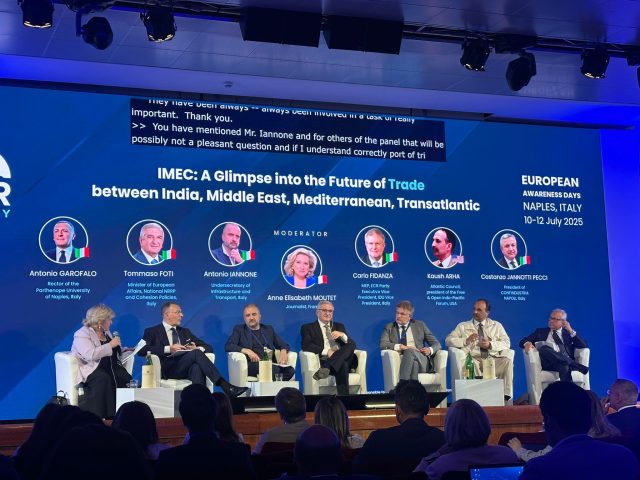
A high-level panel titled “IMEC: a glimpse into the future of trade between India, Middle East, Mediterranean, Transatlantic” was held in Naples, at the heart of the Mediterranean, organized by the European Conservatives and Reformists Group (ECR). The discussion brought together leading figures from the Italian government, business and academic communities, and representatives from the United States. At the center of the debate: the India-Middle East-Europe Economic Corridor (IMEC), a strategic new route for global trade, positioned as an alternative to China’s Belt and Road Initiative.
IMEC as a Democratic Answer to the Belt and Road
Kaush Arha, President of the Free and Open Indo-Pacific Forum and a prominent voice of American conservatism, opened the panel by outlining the geopolitical scope of the project. IMEC, he explained, is more than a commercial infrastructure: it is a shared vision among democratic partners—including India, the United States, Saudi Arabia, the UAE, Italy, France, Germany, and the EU—designed to relaunch global trade based on common values, without relying on autocratic powers like China.
“Where goods don’t flow, armies do,” Arha remarked, highlighting how the revival of the Indo-Mediterranean route is a tool for geopolitical stability as well as economic growth. Comparing IMEC to China’s BRI was inevitable: “IMEC is not BRI. It is multilateral, balanced, and built between nations with converging interests. It is the democratic and competitive answer to decades of unbalanced globalism.”
Tommaso Foti: “Southern Italy is the Mediterranean’s Natural Logistics Platform”
Tommaso Foti, Italy’s Minister for European Affairs, emphasized the national dimension of IMEC and the strategic role of southern Italy. “Italy,” Foti said, “is sitting on a pile of billions. The PNRR alone allocates €75 billion for the South. Yet ports and infrastructure have long been neglected. Europe’s ideological approach to sustainability has effectively blocked Italy’s logistical development.”
Foti denounced the failure of the “Do No Significant Harm” (DNSH) principle to support needed investments in roads, airports, and ports, calling out what he termed the EU’s “punitive” vision of economic growth. “If we want to create development, we must enable goods to move. It’s not development that creates infrastructure, but infrastructure that creates development,” he argued, calling for a pragmatic rather than ideological Europe. He also made a strong case for reviving the special customs status of the Port of Trieste, which enjoys a unique post-war agreement. “Trieste is Italy’s true strategic asset. We cannot let geography be sacrificed for political favoritism,” Foti concluded.
Carlo Fidanza: “Yes to Trade, But with Rules. Enough with Green Ideology Hurting Italy”
Equally determined was Carlo Fidanza, MEP for Fratelli d’Italia and ECR Vice President. He described IMEC as “a response to the age of ruleless globalism,” particularly following China’s entry into the WTO in 2001. “With the Belt and Road, we opened too many ports and too many doors to Beijing. IMEC is the chance to realign trade with geopolitics,” he stated.
Fidanza denounced Europe’s self-sabotage: “Through green ideology, Europe is hurting itself. DNSH, maritime ETS rules, and other environmentalist policies are penalizing European ports while rewarding non-EU ones like Alexandria or Tangier. Goods pollute the same sea, but Europe kneecaps itself.” He praised the Meloni government’s decision not to renew the memorandum with China, viewing the Belt and Road as “a commercial domination plan disguised as cooperation.” By contrast, he said, “IMEC must be built on reciprocity and fair trade. Our companies must be able to compete on common rules—otherwise we’ll face the same imbalances we experienced with Beijing.”
Antonio Iannone: “IMEC and the Mattei Plan Are the New Italian Paradigm”
Senator Antonio Iannone, Undersecretary for Infrastructure, emphasized the complementarity between IMEC and the Mattei Plan for Africa, promoted by the Meloni government. “The South, once seen as a weakness, becomes a strategic hub. Italy is not a transit point—it’s a destination. And Campania becomes the center of this vision,” he said. Iannone stressed that, for the first time, Italy is building a comprehensive infrastructure strategy, integrating ports, interports, railways, and logistics. “Italy is now facing the future from the South. And it does so with a strategy,” he concluded.
Confindustria’s Contribution: “Don’t Be Just a Corridor, Be a Destination”
Costanzo Jannotti Pecci, President of Confindustria Naples, expressed cautious optimism about IMEC. “It’s a great opportunity, but it requires balance. With India, we need industrial and commercial reciprocity to avoid the kind of asymmetry we experienced with China.” He highlighted the uniqueness of Italy’s port system: “We don’t have one mega-port like Rotterdam or Hamburg—we have an integrated national port system. We must act as a single large port, maximizing intermodality and logistical integration.”
The panel offered a coherent and forward-looking vision: a conservative foreign and industrial policy that places Italy at the center of new global trade dynamics. Through IMEC and the Mattei Plan, the Meloni government is reviving the strategic role of the Mediterranean and southern Italy, focusing on infrastructure, logistics, sovereignty, and alliances among democratic nations. As Minister Foti aptly said: “It’s not enough to agree. You must be ready.” Italy is now ready—and wants to play its role as a protagonist.



 Subscribe
Subscribe